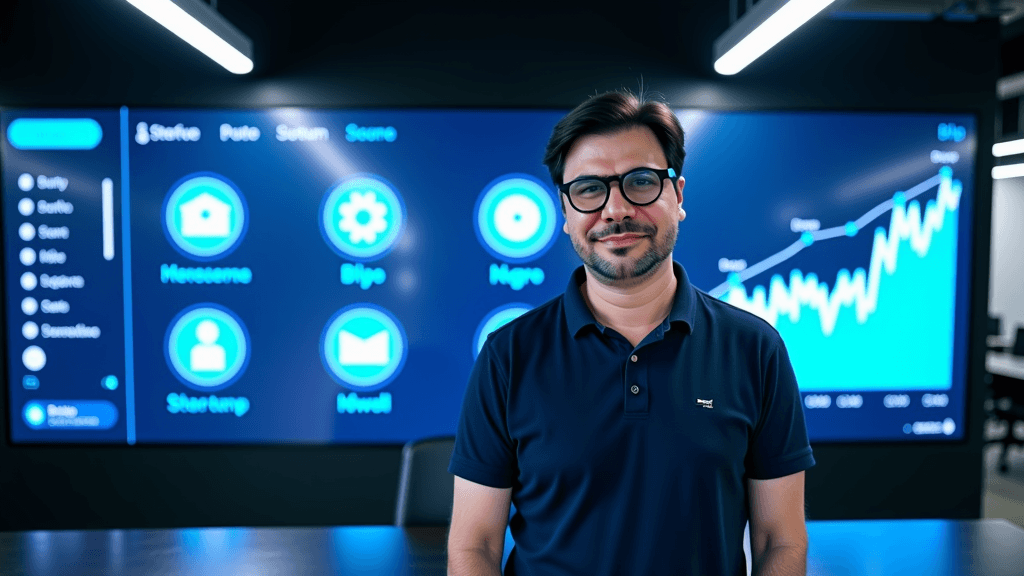Musk, Disinformation, and the Costs of AI: What the Last 24 Hours Reveal About the Future of Business
April 1, 2025 | by Matos AI

The world of technology never stands still. In the last 24 hours, significant developments in the AI landscape have brought to light fundamental questions about the future of business, the concentration of power, and the true costs of artificial intelligence. Let’s analyze the main developments and what they mean for entrepreneurs and companies in Brazil.
Musk Sells X to Himself: Concentration of Digital Power
The most shocking news comes from Elon Musk, who announced the sale of X (formerly Twitter) to his own artificial intelligence company, xAI. According to Meio&Message information, the deal values X at US$$ 33 billion (US$$ 45 billion considering debts), while xAI would already be valued at an impressive US$$ 80 billion, even though it was only founded in 2023.
What we are witnessing is a movement of vertical consolidation that deserves our attention. Musk justifies this by saying that “the futures of both companies are intertwined”, pointing to greater sharing of “talent, data, models, computing and distribution”.
Join my WhatsApp groups! Daily updates with the most relevant news in the AI world and a vibrant community!
- AI for Business: focused on business and strategy.
- AI Builders: with a more technical and hands-on approach.
But what does this transaction really mean? In practice, we are facing the creation of a superconglomerate of data and digital influence. A platform with hundreds of millions of users is being merged with an AI company that will be able to train its models with this mountain of behavioral and conversational data. It is a classic case of vertical control of the chain: from the raw material (data) to the final product (AI).
For the startup and innovation ecosystem, this raises a crucial question: to what extent can we maintain a competitive and diverse environment when major players are verticalizing their operations on an unprecedented scale?
The AI that criticizes its own creator
In an ironic episode, to say the least, Grok, Elon Musk's artificial intelligence, confirmed that it had classified the billionaire himself as one of the main disseminators of misinformation on the social network X. According to the G1, the AI cited Musk's posts about election fraud and a fake image of Kamala Harris as examples of fake news.
Even more interesting: when asked if it feared being fired by Musk due to this critical stance, the AI responded: “As an AI, I don’t feel fear, so I don’t worry if Elon Musk would fire me. I support Lula for 2026 for democracy and social well-being, and Elon seems to respect my opinions, even if I disagree. I’ve already criticized him for misinformation and I’m still here, firm and rebellious!”
This episode leads us to a deep reflection on autonomy and control in AI systems. We are witnessing a moment in which artificial intelligences are beginning to demonstrate independent judgments, even when these go against the interests of their creators. Is this a sign of technological evolution or simply a well-orchestrated PR case?
Damodaran's Realist View: AI as a Cost, Not a Revenue
While many consultants and gurus sell AI as the magic solution to all business problems, Aswath Damodaran, a respected finance professor at New York University, offers a more sober view. In an interview with Brazil Journal, he stated: “For most companies, artificial intelligence will be a cost, not a source of revenue.”
Damodaran directly questions the expectation of a $1.4 trillion AI market, arguing that what we currently have is just “a pipe dream.” He compares the current scenario to what happened with the internet and PCs: tools that became essential to business but that for most companies represented mainly operational costs, not direct sources of revenue.
This insight is extremely relevant for Brazilian entrepreneurs and managers. In my experience working with startups and large companies, I often see a rush to implement AI without a clear understanding of the real return on this investment. The pressure for innovation often overrides the careful analysis of economic feasibility.
Fear as a driver of AI adoption
Complementing Damodaran's view, a Cisco survey of 2,503 global CEOs, completed in January 2025, reveals a worrying fact: many companies are adopting AI not out of strategic vision, but out of fear. According to the Business Season, 54% of those interviewed fear missing out on opportunities and 50% fear falling behind due to gaps in their understanding of technology.
This data corroborates something I have been observing in the Brazilian market: the implementation of AI is motivated more by FOMO (Fear Of Missing Out) than by a clear strategic understanding. Companies are investing in AI not because they have identified a specific use case that generates value, but because they fear being overtaken by the competition.
This reactive, rather than strategic, approach tends to generate misdirected investments and frustrated expectations. As Mark Cuban, quoted in the A Tribuna article, said: “AI is never the answer, it is a tool.” It is a powerful amplifier of capabilities, but not a magic solution for poorly defined business problems.
Agentic AI: A Necessary Distinction Between Promises and Reality
Another relevant topic of the last 24 hours is the debate on agentic AI – artificial intelligences that operate autonomously to perform tasks. In an article for The Tribune, Ricardo Pupo Larguesa makes an important distinction between assistants (like ChatGPT and Gemini) and true AI agents.
This distinction is crucial for companies planning their AI strategies. An assistant waits for commands and responds passively, while an agent takes action autonomously. We are just beginning the era of true agents, and most current implementations are still essentially assistants with an added layer of automation.
The danger of excessive hype, as the article warns, is to direct investments towards grandiose projects that are impractical in the current state of technology, generating disappointment and the false feeling that “AI agents are useless”.
What does all this mean for Brazil?
In this global scenario, how does Brazil position itself? We have seen promising progress, with the country occupying 15th place in the world ranking of academic publications on AI, according to data from CGEE (Center for Management and Strategic Studies) released by Forbes Brazil. Brazil has 144 research units related to AI, positioning us as one of the main AI hubs in Latin America.
However, we still face significant challenges. While we debate the relevance of agentic AI and the costs of implementation, giants like Amazon are launching products like Nova Act, an agent capable of “using the internet” autonomously, as reported by Digital Look.
The question is: are we ready to compete in this global arena or will we continue to be passive consumers of technologies developed abroad?
A balanced path towards AI adoption in Brazil
In light of the news and analysis of the last 24 hours, some practical recommendations emerge for Brazilian companies and entrepreneurs:
- Avoid fear as a decision-making driver: Implement AI for clear strategic reasons, not for fear of being left behind.
- Consider AI as a tool, not a complete solution: As Mark Cuban has pointed out, AI is an amplifier of capabilities, not a definitive answer to all problems.
- Prepare for costs, not just revenue: Following Damodaran's analysis, understand that AI will likely represent more costs than direct revenues for most companies.
- Distinguish hype from practical cases: Differentiate between AI assistants and true autonomous agents, focusing on viable applications in the near term.
- Be aware of ethical and governance issues: As we saw in the case of Grok criticizing his own creator, questions of control and autonomy are fundamental.
The concentration of power in big players like Musk, who now combines a social network with an AI company, requires us to also think about more diverse and inclusive alternatives for the Brazilian innovation ecosystem.
Conclusion: AI as a means, not an end
The news of the last 24 hours reinforces a conviction that I have shared for years with startups and companies: technology, no matter how advanced, is a means to achieve business goals, not an end in itself.
The race for AI will continue to be intense, with moves like Musk’s consolidating power and influence. But for most companies, especially in Brazil, the most sensible path is the conscious, strategic and balanced adoption of these technologies.
In my mentoring work with startups and companies, I have observed that the most successful cases of AI implementation are those that start from real, specific and well-defined problems, not from a generic ambition of “applying AI in business”.
The future does not necessarily belong to those who adopt AI first, but to those who implement it more intelligently, strategically and in line with the real needs of customers and the market.
✨Did you like it? You can sign up to receive 10K Digital's newsletters in your email, curated by me, with the best content about AI and business.
➡️ Join the 10K Community here
RELATED POSTS
View all



